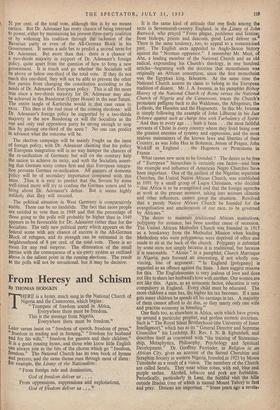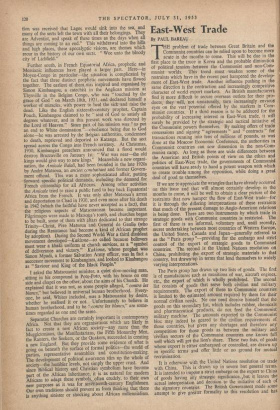From Heresy and Schism
BY THOMAS HODGKIN HERE is a hymn, much sung in the National Church of Nigeria and the Cameroons, which begins : "Trumpets of freedom sound in Africa, Everywhere there must be freedom. This is the message from Nigeria, Everywhere there must be freedom."
Later verses insist on "freedom of speech, freedom of press," " freedom in trading and in farming,' "freedom for husband and for his wife," freedom for parents and their children." It is a good rousing hymn,, and those who know little English can always join in the bits of the chorus which go "freedom, freedom.' The National Church has its own book of hymns and prayers, and the same theme runs through most of them : tor example, the Litany of the Nationalists: "From foreign rule and domination, God of freedom deliver us. . . .
From oppressions, suppressions and exploitations, God of freedom deliver us , . . • It is the same kind of attitude that one finds among the sects in Seventeenth-century England, in the _Litany of John Bastwick, who prayed "From plague, pestilence and famine; from bishops, priests and deacons, good Lord deliver us." There is the same tendency, too, to appeal to a romanticised past. The English sects appealed to Anglo-Saxon history against the "Norman oppressor." I remember Mr. Mazi, of Aba, a leading member of the National Church and an old radical, expounding his Church's theology, in one hundred articles—beginning with the doctrine that monotheism was originally an African conception, since the first monotheist was the Egyptian king, Ikhnaton. At the same time the National Church asserts its claim to belong to the European tradition of dissent. Mr. J. A. Iwunna, in his pamphlet Bishop Heerey of the National Church of Rome versus the Nationat Church of Nigeria and the Cameroons, traces the Church's protestant pedigree back to the Waldenses, the Albigenses, the Lollards, the Hussites and the Huguenots. In this Mr. Iwunne is simply following the example of John Lilburne in his Just Defence against such as charge him with Turbulency of Spirit: And thus in every age. . . hath it been . . . the most faithful servants of Christ in every country where they lived being ever the greatest enemies of tyranny, and oppression, and the most zealous maintainers of the known laws and liberties of their " Country, as was John Hus in Bohemia, Jerom of Prague, John Wickliff in England . . . the Hugonots or Protestants in France. .
What causes new sects to be founded ? The desire to be free of " European " hierarchies is certainly one factor—and here the example and influence of American Negro Churches have been important. One of the earliest of the Nigerian separatist Churches, the United Native African Church, was established in 1891 by a small group of Lagos Christians, who decided "that Africa is to be evangelised and that the foreign agencies at work at the present moment, taking into account climatio and other influences, cannot grasp the situation. Resolved that a purely Native African Church be founded for the evangelisation and amelioration of our race, to be governed by Africans."
The desire to maintain traditional African institutions, polygamy for instance, has been another cause of secession. The United African Methodist Church was founded in 1917 as a breakaway, from the Methodist Mission when leading Methodists who were polygamous were deprived of office and made to sit at the back of the church. Polygamy is defended by some sects not simply because it is traditional, but because it is reasonable. ." Alonio " in a Pamphlet, Church Marriages in Nigeria, puts forward an interesting, if not wholly con- vincing, line of argument: "' In England [polygamy] is regarded as an offence against the State. I dare suggest reasons for this. The Englishwoman is very jealous of love and does not like to share her husband's love with another. Our women are not like this. Again, as an economic factor, education is very compulsory in England. Every child must be educated. The more children a man has, the higher his tax becomes. If a man gets many children he spends all his earnings in tax. A majority of them cannot afford to do this, so they marry only one wife and practise economy in breeding." One finds too, as elsewhere in Africa, sects which have grown up around a particular prophet, and profess esoteric doctrines. Such is "The Royal Silent Brotherhood (the University of Inner Intelligence)," which has as its "General Director and Supreme Councillor" his Lordship, Rt. Rev. J. N. B. Egbutsheh, and describes itself as concerned with "the training of Statesman- ship, Metaphysics, Philosophy, Psychology and Spiritual Development.' Dr. Geoffrey Parrinder, in Religion in an African City, gives an account of the Sacred Cherubim and Seraphim Society in western Nigeria, foundedin 1923 by Moses Tunolashe as a result of a vision. The members of the Church are called Serafu. They wear white robes, with red, blue and purple sashes. Alcohol, tobacco and pork are forbidden. Periodically, particularly in Lent, the faithful visit the hills outside Ibadan (one of which is named Mount Tabor) to fast and pray. Dreams are important. "Some years ago a revel*. tion was received- that Lagos would sink into the sea, and many of the sects left the town with all their belongings. They are Adventist, and speak of these times as the days when all things are coming to an end." This withdrawal into the hills and high places, these apocalyptic visions, are themes which recur in the history of our own sects. "Woe unto the bloody city Of Lichfield.
Further south, in French Equatorial Africa, prophetic and Messianic influences have played a larger part. Here—in Moyen-Congo in particular—the situation is complicated by the fact that three distinct prophetic movements have flowed together. The earliest of them was inspired and organised by Simon Kimbangou, a catechist in the Anglican mission at Thysville in the Belgian Congo, who was "touched by the grace of God" on March 18th, 1921. and declared himself a worker of miracles, with power to heal the sick and raise the dead. Like the English sixteenth-century prophet, Captain Pouch, Kimbangou claimed to be "sent of God to satisfy all degrees whatever, and in this present work was directed by the Lord of Heaven." Since part of his mission was "to put an end to White domination "—obedience being due to God alone—he was arrested by the Belgian authorities, condemned to death, reprieved and deported to Katanga. But the sect spread across the Congo into French territory. At Christmas, 1930, Kimbangist preachers announced that a flood would destroy Brazzaville on January 1st: "War was near—the old kings would give way to new kings." Meanwhile a new organi- sation, the Amicale Balali, had been founded in the late 1920s by Andre Matsoua, an ancien combattant and former Govern- ment official. This was a more sophisticated affair, putting forward specific political demands, including the demand for French citizenship for all Africans. Among other activities the Amicale tried to raise a public fund to buy back Equatorial Africa from the French. It was only after Matsoua's arrest and deportation to Chad in 1930, and even more after his death in 1942 (which the faithful have never accepted as a fact), that the religious aspects of Matsouanism became important. Pilgrimages were made to Matsona's tomb, and churches began to be built, some of them with altars dedicated to that strange Trinity—Christ, Pere Matsoua and General de Gaulle (who during the Resistance had become a kind of African prophet by adoption). During the Second World War a third dissident movement developed—Kakisme—so called because believers must wear a khaki uniform at church services, as a "symbol of deliverance and victory." Kakisme, 'whose pros was Simon Mpadi, a former Salvation Army officer, was u fact a successor movement to Kimbangisin, and looked to Kimbangou as "Saviour and King of the Black People," I asked the Matsouanist minister, a quiet slow-moving man, sitting in his compound in Poto-Poto, with his house on one side and chapel on the other, about the aims of his Church. He explained that it was not, as some people alleged, "contre les blancs," but believed in universal human brotherhood. Every- one, he said, Whites included, was a Matsouanist by desire, whether he realised it or not. Unfortunately to believe in human brotherhood, and to be "contre les blancs," are some- times regarded as one and the same.
Separatist Churches are certainly important in contemporary Africa. Not that they are organisations which are likely in fact to create a new African society—any more than the Muggletonians, the Manifestarians, the Fifth Monarchy Men, the Ranters, the Seekers, or the Quakers, succeeded in creating a new England. But they provide some evidence of what is going on beneath the surface of formal politics—the world of parties, representative assemblies and constitution-making. The development of political awareness stirs up the whole of society—the humbler levels, not simply the upper crust. And since Biblical history and Christian symbolism have become part of the African inheritance, it is as natural for modern Africans to adapt these symbols, often crudely, to their own new purposes as it was for seventeenth-century Englishmen. Our own traditions should prevent us from thinking that there is anything sinister or shocking about African millennialism.



































 Previous page
Previous page